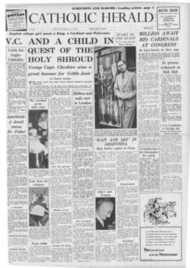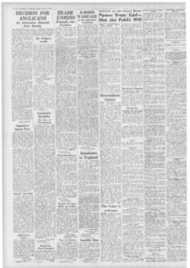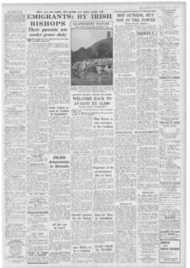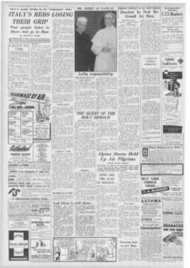Page 4, 15th July 1955
Page 4

Report an error
Noticed an error on this page?If you've noticed an error in this article please click here to report it.
Tags
Share
Related articles
'beware This Leftist Trap'
Giorgio Gave Away The Deputy's Coat
S The Catholic Herald, Friday, June 1, 1956
Don Camillo Comes To Tuscany
Oldest Cardinal Was The `hildebrand' Of Florence
DOUGLAS HYDE'S COLUMN
'Hurricane' Mayor
VATHEN he came to have lunch with me the other day the Mayor of Florence, Prof. La Pira, walked out of the huge Palace of the Signoria—where, among the art treasures of the ages, the city offices are situated —and thumbed a lift on the back of a passing Vespa motor scooter, ridden by a teenage boy. '
To complete this democratic if somewhat unconventional picture, it may he added that we ate our lunch sitting on a landing at the top of the stairs in a home for juvenile delinquents.
La Pira, a small, slim, younglooking man. exudes what one can only describe as a warm, enthusiastic humanity.
Meeting him is like running headon into a hurricane. He is irrepressible. Words, in a loud hut very pleasant voice and backed up by an infectious laugh, come tumbling out of him almost non-stop. His hands and arms never stop working as he talks.
Only twice was there anything to remind me that this exuberent Florentine leads an ascetic life in cell in a monastery.
The first time was when he refused the wine which is the accompaniment to even the humblest of meals in Italy, taking water instead. The second came when, confronted by a howl of rather inferior cherries and very choice peaches. he chose the cherries.
On both occasions he pointed to his stomacth and unconvincingly excused himself on the ground that " these things do not suit my digestion." 1-tis life is, in fact, one of mortification.
E.rceptional place
TusT a few days earlier the Osservatore ROIlla110. daily newspaper of Vatican City. had questioned Prof. 1.a Pira's wisdom in associating with Communists and even accepting the genuineness of their party's current " peace" overtures.
He was clearly in no way depressed. " The first man to be redeemed was a thief," he told me. " so who are we to pick and choose? "
No one ever quite knows what he will do next. They only know that it will he on behalf of the poor. When, for example. employers (for political reasons, it is said) were going to close down their factories. La Pins stepped in and encouraged the workers to occupy and run them.
" Florence," he told me. " is an exceptional place and you can do some exceptional things here." He certainly does them,
He has a wholly admirable ability to see the good in people. Whether he can detect with equal clearsightedness the guile which may also he present in this imperfect world of imperfect men is another matter. Yet it is some thing which an active politician in a land where Communism is strong dare not overlook without grave risk.
But the irrepressible. intensely human Mayor of Florence, if he is conscious of it at all, probahly thinks that the risk is worth while.
Fifteen minutes after the Mayor's departure I was discussing the breakdown of the family in the modern world and its effect upon the growth of juvenile delinquency with quiet-spoken. serene old Cardinal (lath Costa, Archbishop of Florence. It was rather like coming out of a gale into the quiet of a harbour.
The gale is exhilarating. But it does help one to appreciate all the more the peace and quiet of the harbour too.
ilirpouslo Sawa.
IN Rome I was fortunate enough to nice: Ignazio Silone, writer and Socialist Deputy.
Whilst he was still a boy an earthquake killed his mother and five brothers. Under the impact of World War I he joined the Socialists, then swung right over to the Communist Party, for which he worked. clandestinely because of the Mussolini dictatorship. for years.
Those who have read The God That Failed will recall that alone of the six ex-Communists who contributed to it, Silone wrotewith optimism instead of total disillusionment.
Talking to him in his home the other day, it was easy to see why. Despite his years with the Communists and his subsequent association with a party with an anticlerical tradition. Silone is completely Catholic in his culture and his outlook. In his conversation he identifies himself with the thought and life of the Church.
More than anyone else. the man responsible for the fact that Silone is sympathetic where others are hitter and hostile is Don Orione, a man of exceptional charity. and wisdom too. who never lost touch with him. Not even in the years when he was an enemy of the Church.
blog comments powered by Disqus







